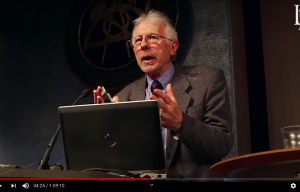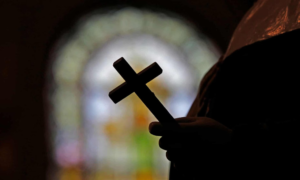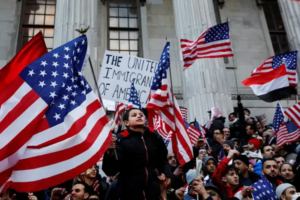This Sunday marks 25 years since the Black teen was shot to death by a white St. Petersburg police officer. What does that moment mean for mayoral candidates Ken Welch and Robert Blackmon?
ST. PETERSBURG — When 18-year-old TyRon Lewis was shot and killed by a St. Petersburg police officer in 1996, Ken Welch called for calm.
Welch, 32 at the time and the son of a three-term city council member, stepped in front of an anguished community and tried to peacefully pull it forward. Some Black residents rebelled, and Welch saw how physicians who did volunteer work were being harmed because they were white.
Six miles west in Pasadena, Robert Blackmon, age 7, watched the angry reaction on his family’s wood-paneled Magnavox. His young mind couldn’t fully comprehend the images he saw on television, but he knew something bad had happened.
Twenty-five years later, Welch and Blackmon are running to lead a city that still lives with the wounds. Both say the shooting and subsequent unrest helped shape their views on policing — and on what must be done to build trust between the community and the department.
Welch, who could become the city’s first Black mayor, said holding police accountable is key.
He also said that the recent spate of slayings in the city mostly involve Black people killing other Black people, and the community must reckon with that, too. It’s a position he has taken since the 1990s, when he railed against gangster rap and the mindset of Black people as victims.
“What caused that young man to want to pick up a gun in the first place?” Welch said in a recent interview with the Tampa Bay Times, referencing shootings that don’t involve police. “That requires connecting young people with hope early.”
Blackmon supports growing the force but assigning officers to smaller geographic beats, so they get to know the residents.
“You want to have as informed and educated a police force as possible,” he said.
His broader plan includes creating more after-school options for children and teenagers. Blackmon is spearheading the revival of the Science Center to get kids interested in marine life, geology, engineering, arts and math. The Science Center was a hub for students and teens for six decades but was shuttered due to financial issues in 2014.
Both Welch and Blackmon also have plans to elevate the neighborhood where Lewis was shot and killed. Although poverty rates have fallen across much of the city, they have stayed flat in the communities south of Central Avenue where the majority of residents are Black. Homeownership has tumbled.
“We have broken our social contract with South St. Pete,” Blackmon said.
Each would-be mayor would have to succeed where predecessors have stumbled.
All of the city’s past leaders have promised to transform its historically Blackneighborhoods. Progress has been elusive.
Many more TyRon Lewises
Lewis, a young Black man, was killed on Oct. 24, 1996, during a traffic stop by a white officer.

Two officers had pulled up behind Lewis at a red light on 18th Avenue South and 16th Street South for speeding. Lewis and a friend refused to unlock the doors or get out. One officer stood in front of the car, gun drawn, and said Lewis kept edging up on him and knocked him onto the hood.
The officer said he feared for his life when he fired at Lewis. The city’s predominantly Black neighborhoods erupted in two days of rioting, rock-throwing and fires — and did so again when a grand jury refused to indict the officer 21 days later.
Lewis’ death enraged those who for years felt Black people were being overpoliced by combative and rude officers.
It was a flashpoint in the city’s history that prompted decades of broken promises.
The two candidates see it differently.
Blackmon says the officer who shot Lewis did nothing wrong.
“The courts found that, too,” Blackmon said. “Who am I to second guess?”
The world saw how Eric Garner, Philando Castile and George Floyd died, and the circumstances surrounding Lewis’ death are an incomplete narrative. Goliath Davis, the police chief brought in after the riots, said the officer who shot Lewis wasn’t following department protocol. Witnesses shared conflicting accounts of what happened. A Tampa Bay Times retelling of the day published in 1997 found significant inconsistencies in the officer’s account, too.
Welch doesn’t believe the shooting was necessary.
“(Davis) felt the officer contributed to the death of that young man,” Welch said.
Frustrations in South St. Petersburg continued when an arbitrator overruled the city’s finding that the officer violated policy by placing himself at risk, and years later when in 2004 a Pinellas jury rejected the family’s attempt to sue St. Petersburg.
Neither Welch nor Blackmon hears Lewis’ name much in the neighborhood where police stopped the teenager’s car. Twenty-five years is a long time. A new generation has reached an age Lewis did not. New residents have moved in who don’t know the city’s history.
Or maybe it’s because since 1996, there have been many more TyRon Lewises — young Black men killed by police under questionable circumstances across the country.
But neither candidate doubts the lasting impact of Lewis’ death on St. Petersburg.
“I think in some ways, it was similar to a George Floyd moment,” Welch said.
Welch said he is prioritizing a turnaround in neighborhoods south of Central Avenue — a process he says he has started by “listening to the people.”
He pointed to his efforts as a county commissioner to create the South St. Petersburg Community Redevelopment Area, which has pumped millions of tax dollars into housing, education, workforce training and other initiatives.
“As mayor, I’m going to intensify the effort to use every one of those dollars for what they were intended,” he said.
To jump-start the area, Blackmon wants to move the city’s Municipal Services Center to Tangerine Plaza, the long-doomed retail center that has become symbolic of the area’s plight. An anchor like a city office building will bring jobs and spur economic growth, he said. Welch opposes this idea.
“Just building facilities is not going to heal the wounds and move folks out of poverty,” he said.
He wants to give young children a solid early education and opportunity to stay away from crime.
Time may be running out to transform the area before existing residents get priced out.
More affluent white families are buying up the cheaper homes amid the city’s housing shortage. One census block that was 96 percent Black in 1999 is now 20 percent white, and the median income in that area is on the rise.
The redevelopment of Tropicana Field could help, Blackmon said. That could bring grant dollars to nearby neighborhoods and give purchasing power that will allow for coffee shops, restaurants and a grocery.
“You’ll be displacing residents if we don’t prepare for it,” Blackmon said “You know, there’s a storm coming, and we can pretend that the weather is fine. Or we can prepare ourselves.”
Rejecting the ‘typical happy narrative’
Some community leaders say Welch’s candidacy itself is a sign of progress.
“There are young Black boys who were motivated by the election of Barack Obama to the presidency,” said state Sen. Darryl Rouson, D-St. Petersburg, who once called on Midtown to secede from St. Petersburg to make a point about the dire need for economic development. “Why not on the local level?”
Esther Eugene, president of the St. Petersburg branch of the NAACP, was 18 years old and living with her mother off 18th Avenue South and 49th Street South when Lewis died. She remembers hearing the helicopters, watching the news and seeing people set garbage cans on fire in the alleys.
There were about 80 fires set and arson attempts, according to a federal report, including houses and businesses lost in Black neighborhoods. Hundreds of rounds of gunfire were reported. Two officers were wounded, including one in a helicopter. The damage estimate, accounting for inflation, was put at more than $10 million.
The NAACP’s Eugene is not endorsing anyone for mayor but said “having an African American mayor reflects on the city’s level of inclusivity for all people.”
Leaders of the International People’s Democratic Uhuru Movement disagree. The group has spent years trying to push the city to recognize Lewis’ death and pay reparations to its Black residents.
Omali Yeshitela, the movement’s founder, rejects the “typical happy narrative” that a community on the cusp of possibly electing its first Black mayor demonstrates progress.
Chimurenga Waller, the group’s president, said not enough has changed for him to trust any candidate.
“We are looking at two candidates,” he said. “We’re having a hard time seeing the difference between them, except one is Black and one is white.”
Times Staff Writer Ian Hodgson contributed to this report.





